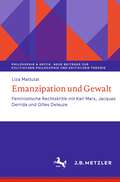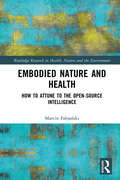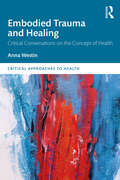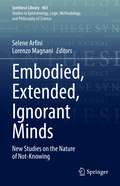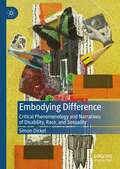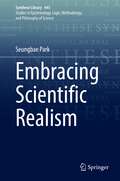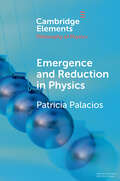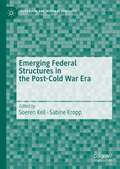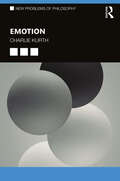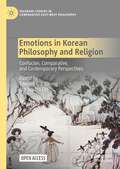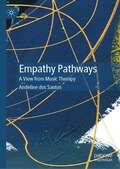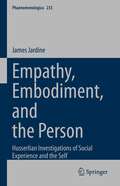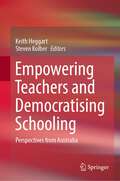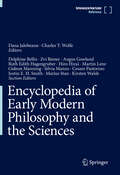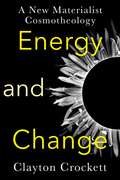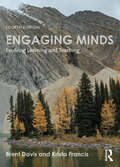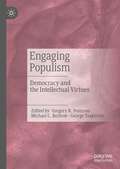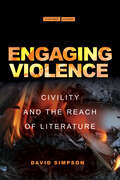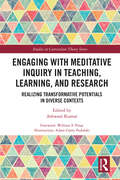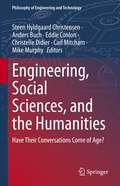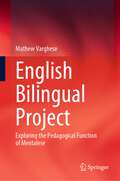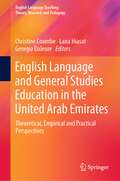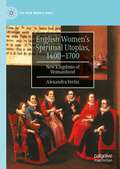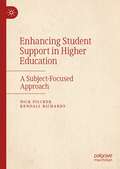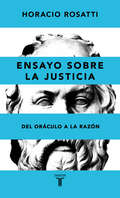- Table View
- List View
Emanzipation und Gewalt: Feministische Rechtskritik mit Karl Marx, Jacques Derrida und Gilles Deleuze (Philosophie & Kritik. Neue Beiträge zur politischen Philosophie und Kritischen Theorie)
by Liza MattutatSoziale Bewegungen stehen seit jeher in einem ambivalenten Verhältnis zum Recht. Einerseits versuchen sie oft, ihre Ansprüche als Rechte geltend zu machen, andererseits kritisieren sie die entpolitisierenden, gewaltsamen und repressiven Aspekte des Rechts. Liza Mattutat fragt deshalb, ob Rechtspolitiken möglich sind, die nicht nur die Inhalte des Rechts, sondern zugleich seine Form verändern. Dazu rekonstruiert sie die rechtskritischen Argumente von Karl Marx, Jacques Derrida und Gilles Deleuze und deutet mit ihnen zeitgenössische Auseinandersetzungen um die Ehe für alle, die Reform des Sexualstrafrechts und die Elternschaft von trans* Personen. Wo sind philosophische Rechtskritiken für die feministische Rechtspolitik einschlägig? Wo steht das bürgerliche Recht emanzipatorischen Bewegungen entgegen?
Embodied Nature and Health: How to Attune to the Open-source Intelligence (Routledge Research in Health, Nature and the Environment)
by Marcin FabjańskiThis book describes how, as a species our survival and capacity to flourish depends on realizing the intimate relationship of humans with nature through active, embodied participation with nature. Living within the physicality of the planet is not a limitation, rather it is our liberation. Full realization of the consequences of this relationship, through embodied action, can liberate us from ego-dependence and transform us into a community of interdependent and flourishing beings. Embodied Nature and Health: How to Attune to the Open-source Intelligence describes a systems analysis of presence-centered cultivation of well-being through particular ways of being physically and mentally active in relation to nature that aims at helping the individual attune to natures’ rhythms. The systems analysis proposes the hypothesis of the Open-source Intelligence: an intelligence which originates from the placement of individual organisms in the tissue and the process of life. This framework draws upon and integrates contemporary research into the human–nature relationship and human well-being, and ancient philosophies that were developed prior to the Cartesian gap between the mind and the body, as well as using an auto-ethnographic approach dervied from the experience of the author. The proposed system highlights a practical approach to well-being, based on research into human attention and its effective usage in daily life. The book outlines a methodology that can be used in schools, as a basis of training in sports, as well as in the field of self-development, and highlights the necessity to develop a new, non-abusive relationship with the natural environment. This novel, multi-discipline, first-of-its-kind research book will be of strong interest to experts and academics in the fields of physical activity, education, ecology, and philosophy.
Embodied Trauma and Healing: Critical Conversations on the Concept of Health (Critical Approaches to Health)
by Anna WestinWhat if philosophy could solve the psychological puzzle of trauma? Embodied Trauma and Healing argues just that, suggesting that one might be needed in order to understand the other. The book demonstrates how the body-mind problem that haunted Descartes was addressed by phenomenologists, whilst also proposing that the human experience is lived subjectively as embodied consciousness. Throughout this book, the author suggests that the phenomenological tools that are used to explore the body can also be an effective way to discuss the physical and mental aspects of embodied trauma. Drawing on the work of Paul Ricœur, Maurice Merleau-Ponty and Emmanuel Lévinas, the book outlines a phenomenological approach to the embodied and relational subject. It offers a reading of embodied trauma that can connect it to wider conversations in psychological underpinnings of trauma through Peter Levine’s somatic research and Bessel van der Kolk’s embodied remembering. Connecting to the analytic tradition, the book suggests that phenomenology can unify both language-based and body-based therapeutic practice. It also presents a compelling discussion that ties the embodied experience of relation in trauma to the wider causal factors of social suffering and relational rupture, intergenerational trauma and the trauma of land, as informed by phenomenology. Embodied Trauma and Healing is essential reading for researchers within the fields of philosophy, psychology and medical humanities for it actively engages with contemporary configurations of trauma theory and recent research developments in healing and mental disorder diagnosis.
Embodied, Extended, Ignorant Minds: New Studies on the Nature of Not-Knowing (Synthese Library #463)
by Lorenzo Magnani Selene ArfiniThis book offers a new and externalist perspective in ignorance studies. Agnotology, the epistemology of ignorance, and, more generally, ignorance studies have grown to cover and explore different phenomena and subjects of research, from known events in history and sociology of science to the investigation of ordinary reasoning and cognitive processing. Nonetheless, although interested scholars have discussed ignorance phenomena and their impact on cognition, most of them have only adopted an internalist perspective to approach this theme. Meanwhile, even though externalist perspectives on cognition flourished in recent literature, authors have paid little attention to the emerging field of ignorance studies. Ignorance has been generally left out from the inquiries on the extension of cognitive states, cognitive processes, and predictive reasoning. Thus, in this volume, we seek to merge the two growing areas of research and to fill this research gap fruitfully. By addressing the uncomfortable themes that pertain to ignorance and related phenomena through an externalist perspective, this book aims to provide much food for thoughts to cognitive scientists and philosophers alike, enriching the current range and reach of both ignorance studies and externalist approaches to cognition.
Embodying Difference: Critical Phenomenology and Narratives of Disability, Race, and Sexuality
by Simon DickelThis book explores how phenomenological ideas about embodiment, perception, and lived experience are discussed within disability studies, critical race theory, and queer studies. Building on these disciplines, it offers readings of memoirs and novels that address the consequences of stigmatization and the bodily dimensions of social differences. The texts include Robert F. Murphy’s The Body Silent, Simi Linton’s My Body Politic, Rod Michalko’s The Two-in-One: Walking with Smokie, Walking with Blindness, three memoirs by Stephen Kuusisto, Vincent O. Carter’s The Bern Book, as well as two novels, Matthew Griffin’s Hide and Armistead Maupin’s Maybe the Moon. All of the texts discussed in this book negotiate the significance of bodily and perceptual habits, the influence of language and culture on embodiment, the importance of relationality and community, the severe effects of misrecognition, and the possibilities of emancipation and social recognition. Hence, they are read as pioneering contributions to the emerging field of critical phenomenology.
Embracing Scientific Realism (Synthese Library #445)
by Seungbae ParkThis book provides philosophers of science with new theoretical resources for making their own contributions to the scientific realism debate. Readers will encounter old and new arguments for and against scientific realism. They will also be given useful tips for how to provide influential formulations of scientific realism and antirealism. Finally, they will see how scientific realism relates to scientific progress, scientific understanding, mathematical realism, and scientific practice.
Emergence and Reduction in Physics (Elements in the Philosophy of Physics)
by Patricia PalaciosThis Element offers an overview of some of the most important debates in philosophy and physics around the topics of emergence and reduction and proposes a compatibilist view of emergence and reduction. In particular, it suggests that specific notions of emergence, which the author calls 'few-many emergence' and 'coarse-grained emergence', are compatible with 'intertheoretic reduction'. Some further issues that will be addressed concern the comparison between parts-whole emergence and few-many emergence, the emergence of effective (-field) theories, the use of infinite limits, the notion of intertheoretic reduction and the explanation of universal and cooperative behavior. Although the focus will be principally on classical phase transitions and other examples from condensed matter physics, the main aim is to draw some general conclusions on the topics of emergence and reduction that can help us understand a variety of case-studies ranging from high-energy physics to astrophysics.
Emerging Federal Structures in the Post-Cold War Era (Federalism and Internal Conflicts)
by Soeren Keil Sabine KroppThis book conceives federalism not as a static institutional architecture, but as a dynamic formation always in flux. This may entail processes of federalization, but in some cases also lead to de-federalization. It looks at emerging federal structures worldwide and analyses federal structures: their emergence, operation and categorization. The contributors highlight that the “emergence” of these federal structures has multiple facets, from the recognition of ethnic diversity to the use of federalism as a tool of conflict resolution. Identifying and categorizing processes of federalization and defederalization in a variety of cases, the book provides much needed empirical and theoretical discussion on emerging federal structures and the changing nature of federalism in the post-Cold War era.
Emotion (New Problems of Philosophy)
by Charlie KurthEmotions have long been of interest to philosophers and have deep historical roots going back to the Ancients. They have also become one of the most exciting areas of current research in philosophy, the cognitive sciences, and beyond. In this book, Charlie Kurth explains the philosophy of the emotions, structuring the book around seven fundamental questions: What are emotions? Are emotions natural kinds? Do animals have emotions? Are emotions epistemically valuable? Are emotions the foundation for value and morality? Are emotions the basis for responsibility? Do emotions make us better people? In the course of exploring these questions, he also discusses cutting-edge empirical research on emotion, feminist approaches to emotions and their value, and methodological questions on how to theorize about the emotions. The book also contains in-depth discussions of specific emotions like compassion, disgust, anxiety, and curiosity. It also highlights emerging trends in emotion research. Including suggestions for further reading and a glossary of key terms, Emotion is ideal for those studying and researching the philosophy of emotion as well as ethics, epistemology, and the philosophies of mind and psychology.
Emotions in Korean Philosophy and Religion: Confucian, Comparative, and Contemporary Perspectives (Palgrave Studies in Comparative East-West Philosophy)
by Edward Y. J. Chung Jea Sophia OhThis pioneering book presents thirteen articles on the fascinating topic of emotions (jeong 情) in Korean philosophy and religion. Its introductory chapter comprehensively provides a textual, philosophical, ethical, and religious background on this topic in terms of emotions West and East, emotions in the Chinese and Buddhist traditions, and Korean perspectives. Chapters 2 to 5 of part I discuss key Korean Confucian thinkers, debates, and ideas. Chapters 6 to 8 of part II offer comparative thoughts from Confucian moral, political, and social angles. Chapters 9 to 12 of part III deal with contemporary Buddhist and eco-feminist perspectives. The concluding chapter discusses ground-breaking insights into the diversity, dynamics, and distinctiveness of Korean emotions.This is an open access book.
Empathy Pathways: A View from Music Therapy
by Andeline dos SantosMany descriptions of empathy revolve around sharing in and understanding another person’s emotions. One separate person gains access to the emotional world of another. An entire worldview holds up this idea. It is individualistic and affirms the possibility of access to other people’s “inner world.” Can we really see inside another, though? And are we discrete, separate selves? How can we best grapple with these questions in the field of music therapy? In response, this book offers four empathy pathways. Two are situated in a constituent approach (that prioritises discrete individuals who then enter into relationships with one another) and two are located in relational approaches (that acknowledge the foundational reality of relationships themselves). By understanding empathy more fully, music therapists, teachers and researchers can engage in ways that are congruent with diverse worldviews and ways of being. Examples used in the book are from active and receptive music therapy approaches as well as from community and clinical contexts, so as to provide clear links to practice. This book will be a valuable resource for academics and postgraduate students within music therapy and allied fields including art therapy, drama therapy, dance/movement therapy, psychology, counselling, occupational therapy and social development studies.
Empathy, Embodiment, and the Person: Husserlian Investigations of Social Experience and the Self (Phaenomenologica #233)
by James JardineThis text explores how self-consciousness and self-understanding differ phenomenologically from the experience and comprehension of others, and the extent to which such relations are constitutively interdependent.Jardine argues that Husserl’s analyses of selfhood and intersubjectivity are animated by the question of what's at stake in recognising an agent’s engagement as the situated response of a person, rather than simply as the comportment of an animal or living body. Drawing centrally from the freshly excavated Ideas II drafts and manuscripts, the author develops Husserl’s often fragmentary investigations of attention, habit, emotion, freedom, the common world, and action, and considers their implications for subjectivity and the experience of others. Empathy, Embodiment, and the Person also brings Husserlian phenomenology into dialogue with twenty-first century philosophical concerns, from accounts of selfhood and agency from analytic philosophy to the treatment of social experience in critical theory.The book shows the reader that transcendental phenomenology can be rejuvenated by engaging with a broader philosophical landscape and will appeal to researchers, students, and instructors in the field.
Empowering Teachers and Democratising Schooling: Perspectives from Australia
by Keith Heggart Steven KolberThis edited book brings together teachers and education academics who are committed to education about, for and through democracy. It presents a diverse range of viewpoints about the challenges facing educators working across different sectors and discusses ways to challenge issues like neoliberalism, excessive managerialism and accountability and privatisation. It also engages with the times that education has, and continues, to fail students. This book outlines both logistical and ideological challenges which educators committed to democracy face and describes innovative approaches they have adopted, including networking, the use of social media and digital tools and extending their reach beyond their local communities to international audiences. It encourages conversations about how educators and academics might re-commit to education for democracy and generate further avenues for discussion and action by educators and academics.
Encyclopedia of Early Modern Philosophy and the Sciences
by Justin E. Smith Angus Gowland Martin Lenz Ruth Hagengruber Zvi Biener Gideon Manning Marius Stan Delphine Bellis Hiro Hirai Silvia Manzo Cesare Pastorino Kirsten WalshThis Encyclopedia offers a fresh, integrated and creative perspective on the formation and foundations of philosophy and science in European modernity. Combining careful contextual reconstruction with arguments from traditional philosophy, the book examines methodological dimensions, breaks down traditional oppositions such as rationalism vs. empiricism, calls attention to gender issues, to ‘insiders and outsiders’, minor figures in philosophy, and underground movements, among many other topics. In addition, and in line with important recent transformations in the fields of history of science and early modern philosophy, the volume recognizes the specificity and significance of early modern science and discusses important developments including issues of historiography (such as historical epistemology), the interplay between the material culture and modes of knowledge, expert knowledge and craft knowledge. This book stands at the crossroads of different disciplines and combines their approaches – particularly the history of science, the history of philosophy, contemporary philosophy of science, and intellectual and cultural history. It brings together over 100 philosophers, historians of science, historians of mathematics, and medicine offering a comprehensive view of early modern philosophy and the sciences. It combines and discusses recent results from two very active fields: early modern philosophy and the history of (early modern) science. Editorial BoardEDITORS-IN-CHIEFDana Jalobeanu University of Bucharest, RomaniaCharles T. Wolfe Ghent University, BelgiumASSOCIATE EDITORSDelphine Bellis University Nijmegen, The NetherlandsZvi Biener University of Cincinnati, OH, USAAngus Gowland University College London, UKRuth Hagengruber University of Paderborn, GermanyHiro Hirai Radboud University Nijmegen, The NetherlandsMartin Lenz University of Groningen, The NetherlandsGideon Manning CalTech, Pasadena, CA, USASilvia Manzo University of La Plata, ArgentinaEnrico Pasini University of Turin, ItalyCesare Pastorino TU Berlin, GermanyLucian Petrescu Université Libre de Bruxelles, BelgiumJustin E. H. Smith University de Paris Diderot, FranceMarius Stan Boston College, Chestnut Hill, MA, USAKoen Vermeir CNRS-SPHERE + Université de Paris, FranceKirsten Walsh University of Calgary, Alberta, Canada
Energy and Change: A New Materialist Cosmotheology (Insurrections: Critical Studies in Religion, Politics, and Culture)
by Clayton CrockettAs humanity continues to consume planetary resources at an unsustainable rate, we require not only new and renewable forms of energy but also new ways of understanding energy itself. Clayton Crockett offers an innovative philosophy of energy that cuts across a number of leading-edge disciplines. Drawing from contemporary philosophies of New Materialism, non-Western traditions, and the sciences, he develops a comprehensive vision of energy as a material process spanning physics, biology, politics, ecology, and religion.Crockett argues that change is foundational to material reality, which is ceaselessly self-organizing. We can observe energy’s effects in the operations of natural selection as well as those at work in human societies. Matter and energy are not an oppositional binary; rather, they are expressions of how change functions in the universe. Ultimately, Crockett argues, we can conceive of God neither as a deity nor as a being but as the principle of change.Informed by cutting-edge theoretical discourses in thermodynamics, science studies, energy humanities, systems theory, continental philosophy, and radical theology, Energy and Change draws on theorists such as Gilles Deleuze, Catherine Malabou, Slavoj Žižek, Karen Barad, Bruno Latour, and Kojin Karatani as well as ideas about spirituality, society, and nature from Amerindian, Vodou, and Neo-Confucian traditions. A foundational work in New Materialist philosophy of religion, this book offers compelling new insights into the structure of the cosmos and our place in it.
Engaging Minds: Evolving Learning and Teaching
by Brent Davis Krista FrancisEngaging Minds: Evolving Learning and Teaching explores the diverse beliefs and practices that define the current landscape of formal education. The revised, updated, and expanded fourth edition of this groundbreaking introduction to current interdisciplinary studies of teaching and teacher education is structured around five prominent "frames" of formal education, together offering an overview of the historical and conceptual influences on educational practice: Early Formal Education – likely emerged alongside the creation of origin myths and the invention of symbol-based writing systems, presenting needs for individuals charged with communicating, interpreting, and maintaining such knowledge; Standardized Education – began to unfold in the 1600s, when public education was invented as a response to the cultural convulsions of industrialization, urbanization, and imperialism; Authentic Education – rose to prominence over the last century as researchers began to untangle the complexity of human cognition; Democratic Citizenship Education – fuelled by civil rights movements of the 1960s, with the realization that schools often contribute to (or at least help to perpetuate) inequities and injustices; Systemic Sustainability Education – an emerging trend, as schools and other cultural institutions find themselves out of step with the transition from a mechanization-focused industrialized society to an ecologically-minded and information-based society. These frames serve as the foci of the five chapters of the book, each with three sections that deal, respectively, with history, epistemology, and pedagogy within the frame. Richly illustrated and designed, additional pedagogical features include multiple strategies to highlight and distinguish important vocabulary in the text, as well as suggestions for delving deeper into a given topic. The fourth edition is also complemented by an online resource, learningdiscourses.com, that provides analyses of more than two thousand discourses on learning in education – including summaries and critiques, along with details on their authorship, their imagery, and their associated discourses.
Engaging Populism: Democracy and the Intellectual Virtues
by Gregory R. Peterson Michael C. Berhow George TsakiridisThe past two decades have witnessed an intensifying rise of populist movements globally, and their impact has been felt in both more and less developed countries. Engaging Populism: Democracy and the Intellectual Virtues approaches populism from the perspective of work on the intellectual virtues, including contributions from philosophy, history, religious studies, political psychology, and law. Although recent decades have seen a significant advance in philosophical reflection on intellectual virtues and vices, less effort has been made to date to apply this work to the political realm. While every political movement suffers from various biases, contemporary populism’s association with anti-science attitudes and conspiracy theories makes it a potentially rich subject of reflection concerning the role of intellectual virtues in public life. Interdisciplinary in approach, Engaging Populism will be of interest to scholars and students in philosophy, political theory, psychology, and related fields in the humanities and social sciences.
Engaging Violence: Civility and the Reach of Literature (Cultural Memory in the Present)
by David SimpsonRecent thinking has resuscitated civility as an important paradigm for engaging with a violence that must be deemed endemic to our lives. But, while it is widely acknowledged that civility works against violence, and that literature generates or accompanies civility and engenders tolerance, civility has also been understood as violence in disguise, and literature, which has only rarely sought to claim the power of violence, has often been accused of inciting it. This book sets out to describe the ways in which these words—violence, literature and civility—and the concepts they evoke are mutually entangled, and the uses to which these entanglements have been put. Simpson's argument follows a broadly historical trajectory through the long modern period from the Renaissance to the present, drawing on the work of historians, political scientists, literary scholars and philosophers. The result is a distinctly new argument about the complex and often mystified entanglements between literature, civility and violence in the anglophone Atlantic sphere. What now are our expectations of civility and literature, separately and together? How do these long-familiar but residually imprecise concepts stand up to the demands of the modern world? Simpson's argument is that, despite and perhaps because of their imperfect conceptualization, both persist as important protocols for the critique of violence.
Engaging with Meditative Inquiry in Teaching, Learning, and Research: Realizing Transformative Potentials in Diverse Contexts (Studies in Curriculum Theory Series)
by Ashwani Kumar Adam Garry PodolskiThis collection of multi/inter-disciplinary essays explores the transformative potential of Ashwani Kumar’s work on meditative inquiry – a holistic approach to teaching, learning, researching, creating, and living – in diverse educational contexts. Aspiring to awaken awareness, intelligence, compassion, collaboration, and aesthetic sensibility among students and their teachers through self-reflection, critique, dialogue, and creative exploration, this volume: Showcases unique ways in which scholars from diverse disciplinary, cultural, and geographic contexts have engaged with meditative inquiry in their own fields. Provides a space where African, Asian, Buddhist, Indigenous, and Western scholars engage with the idea of meditative inquiry from their own cultural, philosophical, and spiritual traditions, perspectives, and practices. Explores a variety of themes in relation to meditative inquiry including arts-based research, poetic inquiry, Africentricity, Indigenous thinking, martial arts, positive psychology, trauma, dispute resolution, and critical discourse analysis. Offers insights into how the principles of meditative inquiry can be incorporated in classrooms and, thereby, contributes to the growing interest in mindfulness, meditation, and other holistic approaches in schools and academia. The diverse and rich contributions contained in this volume offer valuable perspectives and practices for scholars, students, and educators interested in exploring and adopting the principles of meditative inquiry in their specific fields and contexts.
Engineering, Social Sciences, and the Humanities: Have Their Conversations Come of Age? (Philosophy of Engineering and Technology #42)
by Carl Mitcham Steen Hyldgaard Christensen Christelle Didier Mike Murphy Anders Buch Eddie ConlonThis book presents a critical examination of conversations between engineering, social sciences, and the humanities asking whether their conversations have come of age. These conversations are important because ultimately their outcome have real world consequences in engineering education and practice, and for the social and material world we inhabit. Taken together the 21 chapters provide scholarly-argued responses to the following questions.Why are these conversations important for engineering, for social sciences, and for the humanities?Are there key places in practice, in the curriculum, and in institutions where these conversations can develop best?What are the barriers to successful conversations?What proposals can be made for deepening these conversations for the future?How would we know that the conversations have come of age, and who gets to decide?The book appeals to scholarly audiences that come together through their work in engineering education and practice. The chapters of the book probes and access the meetings and conversations, and they explore new avenues for strengthening dialogues that transcend narrow disciplinary confines and divisions.“The volume offers a rich collection of descriptive resources and theoretical tools that will be useful for researchers of engineering practices, and for those aiming to reshape the engineering lifeworld through new policies. The book depicts the current state of the art of the most visible SSH contributions to shaping engineering practices, as well as a map of research gaps and policy problems that still need to be explored.” - Dr. Ir. Lavinia Marin, TU Delft, Electrical Engineering and Philosophy
English Bilingual Project: Exploring the Pedagogical Function of Mentalese
by Mathew VargheseToday, English is the global lingua franca and competent English communication skills should be one of the rights of all educated individuals irrespective of any socio-cultural limits. By introducing a new method, this book focuses on helping any learner to get sufficient communication skills in English as much as in the native language. This method helps one to avoid translating from mother tongue to English. And by using the method of thinking in English, one could acquire the required English bilingual skills naturally. The method is founded on the philosophical idea of mentalese—mind language as the base language of thinking available for humans for constructing thoughts. The proposed English Bilingual Project (EBP) helps one to transfer thoughts from a structureless mentalese to the grammatical structure of any language English/Japanese/Chinese. The method described in this book works in two ways: one it helps one to intuitively understand the working of mentalese; the other is by practicing think in English with the mentalese, one could generate the bilingual brain. The main procedure for transferring thoughts from the mentalese to English is through writing one’s thoughts. This helps one to think effectively in English like one’s own mother tongue. This method works as a prime requirement model for one to generate multilingual skills. The book resourced the idea of mentalese from the classical philosophy, reflects it with the modern generative theories, links it with the studies in neuro-linguistic studies on bilingualism and the bilingual brain.
English Language and General Studies Education in the United Arab Emirates: Theoretical, Empirical and Practical Perspectives (English Language Teaching: Theory, Research and Pedagogy)
by Christine Coombe Georgia Daleure Lana HiasatThis book presents an up-to-date account of current English-language English teaching and General Studies practices in the UAE. The chapters, written by leading language teacher educators, feature theoretical and empirical aspects of teaching, learning, assessment as well as related research. Throughout the book, the link between theory and practice is highlighted and exemplified. This reader-friendly book is suitable for undergraduate and graduate students, teachers, researchers and administrators of English language and general studies programs in the UAE and beyond who wish to keep abreast of recent developments in the field.
English Women’s Spiritual Utopias, 1400-1700: New Kingdoms of Womanhood (The\new Middle Ages Ser.)
by Alexandra VeriniEnglish Women’s Spiritual Utopias, 1400-1700: New Kingdoms of Womanhood uncovers a tradition of women’s utopianism that extends back to medieval women’s monasticism, overturning accounts of utopia that trace its origins solely to Thomas More. As enclosed spaces in which women wielded authority that was unavailable to them in the outside world, medieval and early modern convents were self-consciously engaged in reworking pre-existing cultural heritage to project desired proto-feminist futures. The utopianism developed within the English convent percolated outwards to unenclosed women's spiritual communities such as Mary Ward's Institute of the Blessed Virgin and the Ferrar family at Little Gidding. Convent-based utopianism further acted as an unrecognized influence on the first English women’s literary utopias by authors such as Margaret Cavendish and Mary Astell. Collectively, these female communities forged a mode of utopia that drew on the past to imagine new possibilities for themselves as well as for their larger religious and political communities. Tracking utopianism from the convent to the literary page over a period of 300 years, New Kingdoms writes a new history of medieval and early modern women’s intellectual work and expands the concept of utopia itself.
Enhancing Student Support in Higher Education: A Subject-Focused Approach
by Nick Pilcher Kendall RichardsThis book is about supporting students in Higher Education using language, and specifically using a combination of written text based linguistic approaches alongside and with other non-text related languages. The authors call this a beyond-text subject based approach and argue that this can more effectively help students. The book first outlines and describes a ‘paradigm of linguistics’ that sees support as being only possible through linguistics written text approaches. It then describes how the authors have found through their own research studies that such approaches do not go far enough to best support students. They offer alternatives and justify them theoretically and empirically, and also suggest ways in which others can use similar approaches to best support students in HE. This book will be of interest to practitioners, students, teachers and researchers in the fields of Applied Linguistics, TESOL, English Medium Instruction (EMI), EAP and language education policy.
Ensayo sobre la justicia: Del oráculo a la razón
by Horacio RosattiAsistiremos al lugar y el momento exactos en que la consideración de la idea de justicia experimenta un giro radical y fundante en la historia de Occidente: de destino inexorable impuesto por los dioses a deliberación racional enteramente humana. La más singular perspectiva para recorrer uno de los conceptos de mayor relevancia de nuestra vida. Este libro nos sitúa en el lugar y el momento exactos en que la consideración de la idea de justicia experimenta un giro radical y fundante en la historia de Occidente: de destino inexorable impuesto por los dioses a deliberación racional enteramente humana. A fin de explorar la relación entre libertad, desobediencia y responsabilidad, el autor recobra las incómodas preguntas que tanto Antígona como Sócrates -dispuestos ambos a sacrificar su propia vida para sostener principios que estiman valiosos- se formulan sobre su circunstancia, preguntas que agrietan la idea de justicia de su época y que resuenan aun en la actualidad: ¿Qué tan libres somos para responder por nuestros actos? ¿Cuánto margen tenemos para desobedecer una ley que creemos injusta? ¿Qué relación existe entre la justicia y la verdad? Tercer y último volumen de la trilogía escrita para Taurus por Horacio Rosatti, Ensayo sobre la justicia ofrece la más singular perspectiva para recorrer uno de los conceptos de mayor relevancia de nuestra vida.
